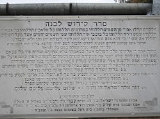
Kiddush Levana
Encyclopedia
Kiddush levana is a Jewish
ritual in which observant Jews recite a series of prayers shortly after Rosh Chodesh
, though it may be done until the moon is full. The ritual is done at night when the moon is shining. The ritual may be performed from three days after the molad
; others wait a full seven days from the molad. The latest time for Kiddush Levanah is mid-month, i.e., fourteen days, eighteen hours and twenty-two minutes (some authorities extend this limit to fifteen full days) after the molad.
It is customary to say Kiddush Levana at the conclusion of Shabbat
if possible. The moon must be visible and not totally covered by clouds and the ceremony is normally performed outside. While it is customary to say the prayer with the large crowd after the Saturday evening services
, or at least with a minyan
, it can be also said without a minyan and in the middle of the week. In places where cloudy or rainy weather is very common, many people will recite the blessing as soon as they see the moon for the first time after the "three days".
In the month of Tishrei
, it is usually delayed until after the conclusion of Yom Kippur
; others have a custom to say it specifically before Yom Kippur. In the month of Av, it is traditionally postponed to following the fast of Tisha B'Av
, as the beginning of the month is a time of mourning and the prayer should be said in a spirit of joy. If a holiday falls on Sunday, Kiddush Levana is delayed until after that day.
Judaism
Judaism ) is the "religion, philosophy, and way of life" of the Jewish people...
ritual in which observant Jews recite a series of prayers shortly after Rosh Chodesh
Rosh Chodesh
Rosh Chodesh or Rosh ḥodesh is the name for the first day of every month in the Hebrew calendar, marked by the appearance of the new moon. The new moon is marked by the day and hour that the new crescent is observed...
, though it may be done until the moon is full. The ritual is done at night when the moon is shining. The ritual may be performed from three days after the molad
Molad
Molad is a Hebrew word meaning "birth" that also generically refers to the time at which the New Moon is "born". The word is ambiguous, however, because depending on the context it could refer to the actual or mean astronomical lunar conjunction , or the molad of the traditional Hebrew...
; others wait a full seven days from the molad. The latest time for Kiddush Levanah is mid-month, i.e., fourteen days, eighteen hours and twenty-two minutes (some authorities extend this limit to fifteen full days) after the molad.
It is customary to say Kiddush Levana at the conclusion of Shabbat
Shabbat
Shabbat is the seventh day of the Jewish week and a day of rest in Judaism. Shabbat is observed from a few minutes before sunset on Friday evening until a few minutes after when one would expect to be able to see three stars in the sky on Saturday night. The exact times, therefore, differ from...
if possible. The moon must be visible and not totally covered by clouds and the ceremony is normally performed outside. While it is customary to say the prayer with the large crowd after the Saturday evening services
Jewish services
Jewish prayer are the prayer recitations that form part of the observance of Judaism. These prayers, often with instructions and commentary, are found in the siddur, the traditional Jewish prayer book....
, or at least with a minyan
Minyan
A minyan in Judaism refers to the quorum of ten Jewish adults required for certain religious obligations. According to many non-Orthodox streams of Judaism adult females count in the minyan....
, it can be also said without a minyan and in the middle of the week. In places where cloudy or rainy weather is very common, many people will recite the blessing as soon as they see the moon for the first time after the "three days".
In the month of Tishrei
Tishrei
Tishrei or Tishri , Tiberian: ; from Akkadian "Beginning", from "To begin") is the first month of the civil year and the seventh month of the ecclesiastical year in the Hebrew calendar. The name of the month is Babylonian. It is an autumn month of 30 days...
, it is usually delayed until after the conclusion of Yom Kippur
Yom Kippur
Yom Kippur , also known as Day of Atonement, is the holiest and most solemn day of the year for the Jews. Its central themes are atonement and repentance. Jews traditionally observe this holy day with a 25-hour period of fasting and intensive prayer, often spending most of the day in synagogue...
; others have a custom to say it specifically before Yom Kippur. In the month of Av, it is traditionally postponed to following the fast of Tisha B'Av
Tisha B'Av
|Av]],") is an annual fast day in Judaism, named for the ninth day of the month of Av in the Hebrew calendar. The fast commemorates the destruction of both the First Temple and Second Temple in Jerusalem, which occurred about 655 years apart, but on the same Hebrew calendar date...
, as the beginning of the month is a time of mourning and the prayer should be said in a spirit of joy. If a holiday falls on Sunday, Kiddush Levana is delayed until after that day.

